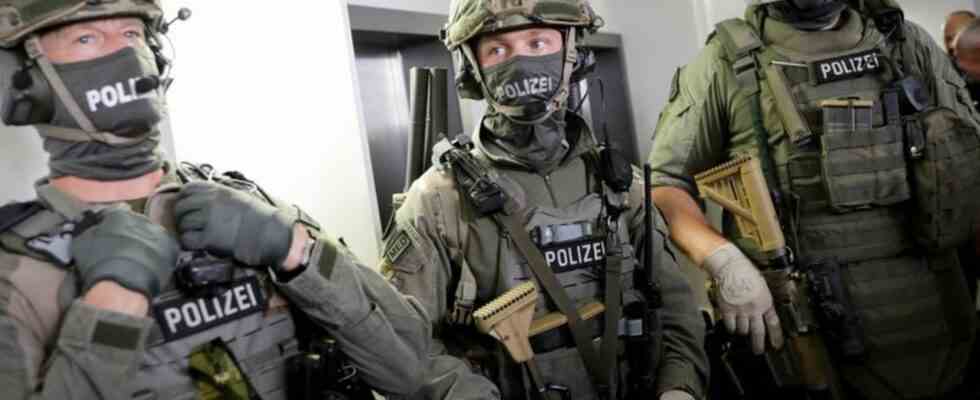special unit
50 years of GSG 9 – solidarity beyond the period of service
The GSG 9 was founded on September 26, 1972 as a reaction to the failed police operation at the Olympic Games in Munich. photo
© picture alliance / Kay Nietfeld/dpa
For many former members of the GSG 9, service in the special unit was more than just a job. The connection to the “comrades” often lasts a lifetime.
For more than 35 years, Dieter Fox has no longer formally belonged to it. But he feels connected to the GSG 9 to this day. In his living room, the activity badge with the federal eagle and oak leaves hangs in cast iron on the wall. For the 75-year-old, there is no question that he will be there when the special unit of the Federal Police celebrates the 50th anniversary of its founding in Bonn this Friday. Like him are many who were once part of the unit.
The GSG 9 Kameradschaft eV has existed since 1982, and most of those who have left have joined. The commander of the special unit – Jerome Fuchs since 2014 – comes to the annual meeting of the association at the location of GSG 9 in Sankt Augustin as a guest of honour. “For some time now, esprit de corps has always been spoken of negatively, but for me this term has positive connotations,” says Fox. After all, it is normal for people who have to rely on each other in life-threatening situations to develop a deep bond.
GSG 9 founded in 1972 after the kidnapping at the Olympic Games
The GSG 9 was launched within a few days on September 26, 1972 as a reaction to the failed police operation at the Olympic Games in Munich. On September 5, 1972, Palestinian assassins broke into the accommodation of the Israeli athletes in the Olympic Village, shot dead two men and took nine hostages. Around 18 hours later, a rescue attempt at the airfield in Fürstenfeldbruck ended in a bloodbath. All nine hostages, one policeman and five assassins died.
Fox was among the first officers to apply for service in the new unit. His motivation: “The German police were not prepared for terrorism, the operation at the Olympics was helpless, pathetic and catastrophic. I wanted to help change that.”
The training under the first commander, Ulrich Wegener, was demanding and improvised, he recalls. After all, there were no training programs in Germany at the time that you could use as a guide. “Since we didn’t have anything, when it came to sports and tactics, we used the parachutists of the Wehrmacht – of course without any ideological affinity,” says the former police officer, who – although now retired – now advises a security company. “We were good – with the means we had back then. Today the GSG 9 is better by classes.”
Called in amok and terror situations or raids
The GSG 9 has parachutists, precision shooters, divers and boat drivers as well as specialists for handling chemical, biological and radioactive hazardous substances in its operational units. They are called not only in amok or terror situations, but also when their skills are needed for arrests and searches – for example in the rocker milieu or in executive measures against gangs of people smugglers.
For many people, the name GSG 9 is still associated with the storming of the Lufthansa aircraft “Landshut” in October 1977. A Palestinian commando had hijacked the passenger plane with more than 90 people to the Somali capital Mogadishu. During “Operation Magic Fire” Fox and other GSG-9 officers entered the plane at night and killed three of the four hijackers. No policeman and none of the hostages were killed during the liberation operation. The difficult operation also attracted a great deal of attention outside of Germany. “What was achieved back then still opens many doors for us internationally today,” says Commander Fuchs.
Fox says he’s “proud to have been involved”. He still keeps in touch with some of the hostages from back then. He is not unhappy that he had no role in another operation that became known as “Celler Loch”. On the night of July 25, 1978, a 40-centimeter hole was blasted into the outer wall of the high-security prison in Celle – GSG 9 provided technical assistance. Years later it turned out that the background to the supposed liberation action was the attempt by the Office for the Protection of the Constitution and the Lower Saxony state government to infiltrate informants into the narrow circle of RAF terrorists.
Dark hours in the history of the GSG 9
One of the darkest hours in the history of the unit was the mishaps in the Bad Kleinen train station in Mecklenburg-Western Pomerania, where the suspected RAF terrorists Birgit Hogefeld and Wolfgang Grams were to be arrested in 1993. Two people die: Grams and GSG-9 officer Michael Newrzella. In 2004, two GSG 9 officers were killed in Iraq – their convoy was ambushed.
So far there are no women in the GSG 9 operational units. This may be due to the fact that police officers who apply here all – regardless of gender – have to meet the same extremely high athletic requirements. Anyone who works for GSG 9 of the Federal Police is not allowed to say much about their work in their private lives. The police officers are masked on duty. Except for the leadership, nobody shows their face in public.

